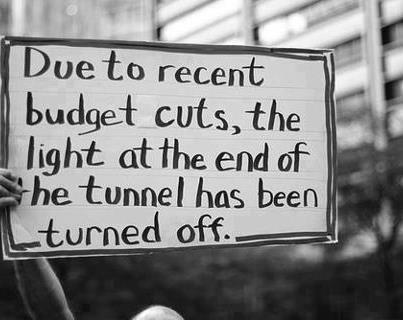Today marks seventy three days since the Inauguration of President Trump. In those seventy three days, we’ve seen immigration bans, and dashed plans to dismantle the Affordable Care Act. We’ve also seen an Executive Order that repeals protections against climate change.
The Trump Administration has also released its proposed budget. Included on the chopping block is funding for the EPA, affordable housing programs through HUD, and grants for Catholic Charities. Also on the table are massive cuts to the budget for the National Endowment for the Arts, National Endowment for the Humanities, PBS and NPR. Finally, refugees around the world who are displaced from their homes because of war and natural crises would be severely hurt.
At the same time, the budget proposes a $54 billion increase in defense spending. While military spending is lower than years in recent past, this still this marks an increase from the estimated $597 billion in 2016. The National Priorities Project estimates the military represented over fifty percent of government discretionary spending in 2015.
We should be concerned because the budget impacts our daily lives: we drive on federal highways and use city transportation, listen to National Public Radio, and enjoy better communities due to community block grants. Thus, budget cuts should prompt us to think more deeply than just our personal interest. As Zach Carter and Arthur Delany write, “a presidential budget isn’t so much a policy proposal as a statement of an administration’s moral vision for the country.” Just as in personal planning, budgets represent the priorities of our national community. Said another way, the budget prompt us to ask hard questions about the kind of America the budget imagines. Is this the America we ought to be? Are these the values we should organize our community and country around?
At the core of this budget is greed and selfishness. The mentality lurking beneath the surface is a belief that what is most important is profit-maximization and safety. It is an assertion that protecting the environment is not necessary, nor is caring for the most vulnerable persons. Sesame Street, and a Jesuit-led documentary on Flannery O’Connor are cut due to the same logic: what Trump is proposing is that creativity is important – but only if it enhances one’s ability to make money. In response, some argue we need authentic creativity – especially via the humanities – more than ever.
In fairness to Mr. Trump, the problem is not new. In the late 1960s, Martin Luther King Jr. suggested that
if we are to get on the right side of the world revolution, we as a nation must undergo a radical revolution of values. We must rapidly begin the shift from a thing-oriented society to a person-oriented society. When machines and computers, profit motives and property rights, are considered more important than people, the giant triplets of racism, extreme materialism, and militarism are incapable of being conquered.
What King is saying is that if we think more about money and security than the persons around us, we have sided with evil. Our democracy needs different organizing values – we must break out of an ideology that suggests profit and efficiency are more important than people and relationships. If we value being “we the people,” we must recognize that our democracy depends on having public goods shared in common. Our earth is our common home and in need of protection for ourselves and future generations.
King suggests that “a time comes when silence is betrayal.” Betrayal to our neighbor, our community, and our earth.
***
We must take action if we are to live faithfully.
- We can contact elected officials: With email and cell phones, it is easier than ever to contact Congressional Leaders. We can also target specific committees including the Budget Committee in both the House and the Senate. We can also contact the White House directly, though President Trump is only receiving emails slightly longer than a tweet.
- We can stay informed or give money to organizations committed to making America whole again – helping the poor, standing up for civil liberties, and protecting a free press.
- We can learn about specific programs that will be cut, and participate in them – through community groups, we can think creatively together about how to support, supplement, and replace threatened programs like those that support food-security and affordable housing.
- We can link our prayer with these actions.
And finally, we can dialogue with one another to ask questions of what our country ought to look like. These questions hit deeper than whether to increase or decrease spending: they strike at the root of how we envision our community. We can sit down at the kitchen counter or over a coffee with a friend and ask these hard hitting questions. Furthermore, we can talk with that relative or friend we disagree with – not just about policy decisions but about national identity. We can see where our visions of America differ and come together.
To return once more to Martin Luther King Jr., “We are at the moment when our lives must be placed on the line if our nation is to survive its own folly. Every man of humane convictions must decide on the protest that best suits his convictions, but we must all protest.” If we don’t, we risk sacrificing our country to the gods of fear and greed. This is our moment to stand with and for our community and earth.
***
Image courtesy FlickrCC user WhatTheFeed .com.


